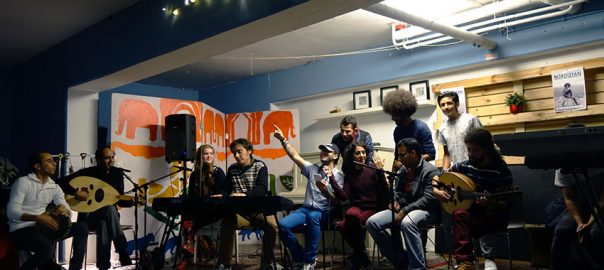News and Noise! was invited to a musical event at the Immigration detention center or asylum seekers reception center (AZC for short in Dutch) located at a former military hospital in Utrecht. Moroccan poet, musician and spoken word artist Walid Ben Selim (N3erdstan) gave performances. This event is a collaboration of the organizations Vrolijkheid and Culture Connection.
by Hatim Suleiman and Charlie Crooijmans
Utrecht – The asylum seekers come together twice a week to sing and play their music in the basement of the building at the AZC. Jonas Bisquert, a Spanish musician who lives in the Netherlands for 5 years, leads the musical evenings with support of the organization Vrolijkheid. Jonas told us that the activity actually started as a musical choir for kids and their families staying at the AZC. It then developed into open musical evenings where the asylum seekers can come to sing or play music. Jonas saw all kinds of musicians pass by, from youngsters who give a go at a pop song just for fun, amateur musicians, to high level professionals with a music degree and who were active in the professional scene in their home countries.
This evening’s special guest, Walid Ben Selim (known as N3rdistan and accompanied by Widad Broco), has been working with the refugees for a couple of days. He gave a few lessons in Rap, and he got a chance to play and share musical ideas with current and past residents of the AZC. Ten or so musicians exchanged instruments and microphones and anybody present wanting to join in felt free to do so. The simple chairs and a couple of couches where one can sit next to the musicians added to the informal and homely atmosphere.
The evening started with a widely popular Arabic song Nassam alayna al hawa of the Lebanese diva Fairouz. The musicians played a range of popular songs of the Levant. Syrian young teenager Muhanad was proud to present the rap technique he learned from N3rdstan (rapping a very challenging old Arabic poem from 9th century Baghdad. Walid Ben Salem picked up his Guembri (string instrument) and started playing a Gnawa piece (the black African music of Morocco) .The Syrian musicians eventually joined in a spontaneous experiment of mixing this African music with a quite different oriental tradition. Walid gave a powerful rap of his own accompanied by Widad.
The music ended as it was started with longing to a lost home; another nostalgic song of Fairouz Ya jabal leb’eid (O, far away mountain).
It was obvious how important this music exercise was for the refugees especially the musicians and the youngsters among them. We had a quick talk with Walid about this experience:
What does it mean to be and work in a place like this?
Walid: It means meeting people, discover so many talents and share the vibration.
How do you see the experience here at a refugee center; a refugee centre with temporary guests in forced exile and with “refugees” as an issue on the political and social agenda in Europe with some welcoming but many not or suspicious .
Walid: First thing, one comes to meet people, just people. The moment we use a word like ‘refugee’ to describe someone, it’s like creating two persons: a human and a refugee, or a citizen and a refugee. But behind these words, it’s simply a human being like yourself. When you meet it’s simply meeting another human.
You and Widad spent some time working with the young guys here. How did this go?
Walid: The young people I met here love Rap and modern songs. We talked to them and they told us they wanted to learn how to Rap, to learn some technicalities and flows. Our aim (N3erdstan) in music is to build bridges between generations and between cultures; Eastern and Western and also between different Arab cultures. It is important for us to use the classical Arabici, because this creates a bridge between our generation and the generation of our parents and also between my country Morocco and other Arabic speaking people in Iraq or Syria.
